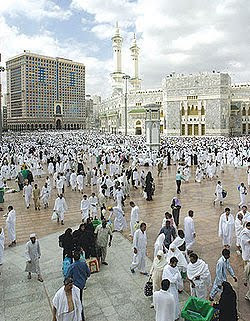
Saudi Arabia, the birthplace of Islam, will start the Muslim fasting month of Ramadan on Saturday.
Muslims scan the sky at night in search of the new moon to determine the start of Ramadan, the holiest month for the world's more than one billion Muslims, during which observant believers fast from dawn to dusk.
Businesses and offices reduce opening hours during the day and often re-open in the evenings.
During Ramadan, Muslims are required to abstain from food, drink and sex from dawn until dusk as life slips into a lower gear during the day. Activity peaks between "iftar", the breaking of the fast at sunset, and "suhur", the last meal of the day before sunrise.
However, rising swine flu numbers and warnings from governments and the World Health Organisation have heightened fears of being in crowded places.
The impact of the pandemic on Ramadan iftar dinners when people sometimes invite hundreds to break the fast together in homes, tents, and hotel ballrooms just after sunset has yet to be seen.
Normally several hundred thousand people travel to Mecca during Ramadan to perform the umrah, a shortened version of the hajj major pilgrimage that takes place in late November this year.
The umrah is popular because people can come at any time and do not need the permits that are assigned to countries by quota for the hajj, which is required of Muslims once in their lifetime if they have the means.
Business in the holy city of Mecca could be down by 40 per cent in the coming month because of flu fears.
However, . . . . . .
A record Ramadan shopping spree has boosted sales in the West End of London this summer.
Sales of perfume - a traditional gift at the end of the Muslim festival - over the past four weeks are up 60 per cent at Selfridges, compared with last year thanks to a surge in the number of wealthy Middle Eastern visitors.
Nearly 150,000 are thought to have visited London in the past month to escape the scorching heat of home. The weak pound has made it better value to buy goods in Britain than in Paris or Milan.
Several shops have introduced later closing in the run-up to Ramadan to suit Middle Eastern customers who are used to shopping in the evening at home when it is cooler.
Selfridges saw sales double of perfumes by Trish McEvoy, Tom Ford and Chanel whose powerful, heady scents are popular with Middle Eastern women.
The store has more than 50 Arabic - speaking staff and it's Clarins counter has introduced a secluded area for sampling beauty products which has proved popular with Muslim women who do not want to remove their hijab in public.
Ramadan, the ninth month of the Islamic year, was the month in which the Prophet Muhammad, received his first divine revelation from the Angel Gabriel.
For this reason, it was chosen by the Prophet as a month of fasting, a time in which every Muslim could "cultivate piety".
For this reason, it was chosen by the Prophet as a month of fasting, a time in which every Muslim could "cultivate piety".
During Ramadan, Muslims are exhorted to read the whole of the Holy Qu"ran.
The "Night of Determination", the night during which Muhammad received his first revelation, falls towards the end of Ramadan. On this night, the Holy Qu"ran tells Muslims that Allah sets the course of the world and all human affairs for the coming year.
The "Night of Determination", the night during which Muhammad received his first revelation, falls towards the end of Ramadan. On this night, the Holy Qu"ran tells Muslims that Allah sets the course of the world and all human affairs for the coming year.
You give but little when you give of your possessions
It is when you give of yourself that you truly give
For what are your possessions but things you keep and guard for fear you may need them tomorrow.
And tomorrow, what shall tomorrow bring to the overprudent dog burying bones in the trackless sand as he follows the pilgrims to the holy city?
Tisbahi ala Kheer! Good night ladies!

Very Interesting
ReplyDelete